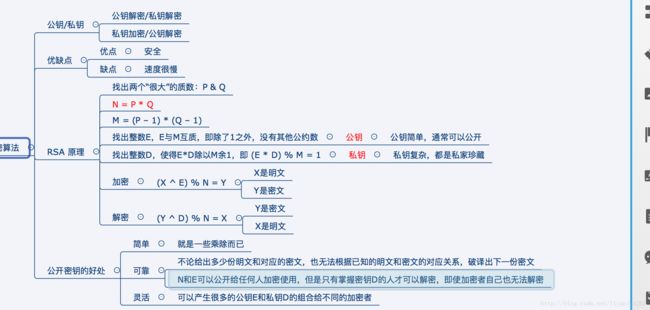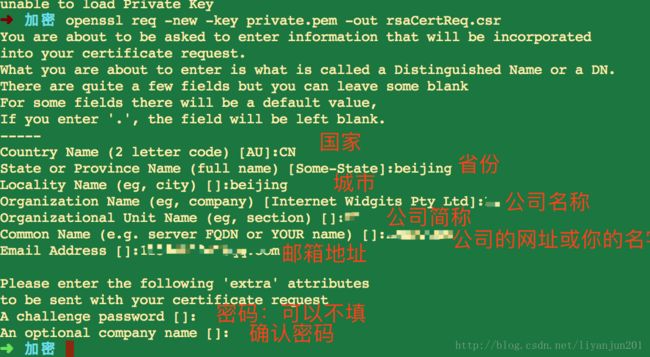算法简介
RSA算法是一种非对称密码算法,所谓非对称,就是指该算法需要一对密钥,使用其中一个加密,则需要用另一个才能解密。
RSA的算法涉及三个参数,n、e1、e2。
其中,n是两个大质数p、q的积,n的二进制表示时所占用的位数,就是所谓的密钥长度。
e1和e2是一对相关的值,e1可以任意取,但要求e1与(p-1)(q-1)互质;再选择e2,要求(e2e1)mod((p-1)*(q-1))=1。
(n,e1),(n,e2)就是密钥对。其中(n,e1)为公钥,(n,e2)为私钥。
RSA加解密的算法完全相同,设A为明文,B为密文,则:A=B^e2 mod n;B=A^e1 mod n;(公钥加密体制中,一般用公钥加密,私钥解密)
e1和e2可以互换使用,即:
A=B^e1 mod n;B=A^e2 mod n;
开发步骤
1.生成秘钥
-
生成私密秘钥1024位的私钥
openssl genrsa -out private.pem 1024 利用私钥生成公钥
openssl rsa -in private_key.pem -out rsa_public_key.pem -pubout生成请求生成证书dea文件
openssl req -new -key private.pem -out rsaCertReq.csr
- 生成签名证书
openssl x509 -req -days 3650 -in rsaCertReq.csr -signkey private.pem -out rsaCert.crt
5.生成苹果需要的der证书
openssl x509 -outform der -in rsaCert.crt -out public_key.der
- 生成p12文件
openssl pkcs12 -export -out private_key.p12 -inkey private.pem -in rsaCert.crt
期间要输入密码,这个密码一定要记住
也可以用下面的代码生成.sh文件进行执行即可
#!/usr/bin/env bash
echo "Generating RSA key pair ..."
echo "1024 RSA key: private_key.pem"
openssl genrsa -out private_key.pem 1024
echo "create certification require file: rsaCertReq.csr"
openssl req -new -key private_key.pem -out rsaCertReq.csr
echo "create certification using x509: rsaCert.crt"
openssl x509 -req -days 3650 -in rsaCertReq.csr -signkey private_key.pem -out rsaCert.crt
echo "create public_key.der For IOS"
openssl x509 -outform der -in rsaCert.crt -out public_key.der
echo "create private_key.p12 For IOS. Please remember your password. The password will be used in iOS."
openssl pkcs12 -export -out private_key.p12 -inkey private_key.pem -in rsaCert.crt
echo "create rsa_public_key.pem For Java"
openssl rsa -in private_key.pem -out rsa_public_key.pem -pubout
echo "create pkcs8_private_key.pem For Java"
openssl pkcs8 -topk8 -in private_key.pem -out pkcs8_private_key.pem -nocrypt
echo "finished."
2.加密解密工具类
头文件
#import
@interface RSAEncryptor : NSObject
/**
* 加密方法
*
* @param str 需要加密的字符串
* @param path '.der'格式的公钥文件路径
*/
+ (NSString *)encryptString:(NSString *)str publicKeyWithContentsOfFile:(NSString *)path;
/**
* 解密方法
*
* @param str 需要解密的字符串
* @param path '.p12'格式的私钥文件路径
* @param password 私钥文件密码
*/
+ (NSString *)decryptString:(NSString *)str privateKeyWithContentsOfFile:(NSString *)path password:(NSString *)password;
/**
* 加密方法
*
* @param str 需要加密的字符串
* @param pubKey 公钥字符串
*/
+ (NSString *)encryptString:(NSString *)str publicKey:(NSString *)pubKey;
/**
* 解密方法
*
* @param str 需要解密的字符串
* @param privKey 私钥字符串
*/
+ (NSString *)decryptString:(NSString *)str privateKey:(NSString *)privKey;
体文件
#import "RSAEncryptor.h"
#import
@implementation RSAEncryptor
static NSString *base64_encode_data(NSData *data){
data = [data base64EncodedDataWithOptions:0];
NSString *ret = [[NSString alloc] initWithData:data encoding:NSUTF8StringEncoding];
return ret;
}
static NSData *base64_decode(NSString *str){
NSData *data = [[NSData alloc] initWithBase64EncodedString:str options:NSDataBase64DecodingIgnoreUnknownCharacters];
return data;
}
#pragma mark - 使用'.der'公钥文件加密
//加密
+ (NSString *)encryptString:(NSString *)str publicKeyWithContentsOfFile:(NSString *)path{
if (!str || !path) return nil;
return [self encryptString:str publicKeyRef:[self getPublicKeyRefWithContentsOfFile:path]];
}
//获取公钥
+ (SecKeyRef)getPublicKeyRefWithContentsOfFile:(NSString *)filePath{
NSData *certData = [NSData dataWithContentsOfFile:filePath];
if (!certData) {
return nil;
}
SecCertificateRef cert = SecCertificateCreateWithData(NULL, (CFDataRef)certData);
SecKeyRef key = NULL;
SecTrustRef trust = NULL;
SecPolicyRef policy = NULL;
if (cert != NULL) {
policy = SecPolicyCreateBasicX509();
if (policy) {
if (SecTrustCreateWithCertificates((CFTypeRef)cert, policy, &trust) == noErr) {
SecTrustResultType result;
if (SecTrustEvaluate(trust, &result) == noErr) {
key = SecTrustCopyPublicKey(trust);
}
}
}
}
if (policy) CFRelease(policy);
if (trust) CFRelease(trust);
if (cert) CFRelease(cert);
return key;
}
+ (NSString *)encryptString:(NSString *)str publicKeyRef:(SecKeyRef)publicKeyRef{
if(![str dataUsingEncoding:NSUTF8StringEncoding]){
return nil;
}
if(!publicKeyRef){
return nil;
}
NSData *data = [self encryptData:[str dataUsingEncoding:NSUTF8StringEncoding] withKeyRef:publicKeyRef];
NSString *ret = base64_encode_data(data);
return ret;
}
#pragma mark - 使用'.12'私钥文件解密
//解密
+ (NSString *)decryptString:(NSString *)str privateKeyWithContentsOfFile:(NSString *)path password:(NSString *)password{
if (!str || !path) return nil;
if (!password) password = @"";
return [self decryptString:str privateKeyRef:[self getPrivateKeyRefWithContentsOfFile:path password:password]];
}
//获取私钥
+ (SecKeyRef)getPrivateKeyRefWithContentsOfFile:(NSString *)filePath password:(NSString*)password{
NSData *p12Data = [NSData dataWithContentsOfFile:filePath];
if (!p12Data) {
return nil;
}
SecKeyRef privateKeyRef = NULL;
NSMutableDictionary * options = [[NSMutableDictionary alloc] init];
[options setObject: password forKey:(__bridge id)kSecImportExportPassphrase];
CFArrayRef items = CFArrayCreate(NULL, 0, 0, NULL);
OSStatus securityError = SecPKCS12Import((__bridge CFDataRef) p12Data, (__bridge CFDictionaryRef)options, &items);
if (securityError == noErr && CFArrayGetCount(items) > 0) {
CFDictionaryRef identityDict = CFArrayGetValueAtIndex(items, 0);
SecIdentityRef identityApp = (SecIdentityRef)CFDictionaryGetValue(identityDict, kSecImportItemIdentity);
securityError = SecIdentityCopyPrivateKey(identityApp, &privateKeyRef);
if (securityError != noErr) {
privateKeyRef = NULL;
}
}
CFRelease(items);
return privateKeyRef;
}
+ (NSString *)decryptString:(NSString *)str privateKeyRef:(SecKeyRef)privKeyRef{
NSData *data = [[NSData alloc] initWithBase64EncodedString:str options:NSDataBase64DecodingIgnoreUnknownCharacters];
if (!privKeyRef) {
return nil;
}
data = [self decryptData:data withKeyRef:privKeyRef];
NSString *ret = [[NSString alloc] initWithData:data encoding:NSUTF8StringEncoding];
return ret;
}
#pragma mark - 使用公钥字符串加密
/* START: Encryption with RSA public key */
//使用公钥字符串加密
+ (NSString *)encryptString:(NSString *)str publicKey:(NSString *)pubKey{
NSData *data = [self encryptData:[str dataUsingEncoding:NSUTF8StringEncoding] publicKey:pubKey];
NSString *ret = base64_encode_data(data);
return ret;
}
+ (NSData *)encryptData:(NSData *)data publicKey:(NSString *)pubKey{
if(!data || !pubKey){
return nil;
}
SecKeyRef keyRef = [self addPublicKey:pubKey];
if(!keyRef){
return nil;
}
return [self encryptData:data withKeyRef:keyRef];
}
+ (SecKeyRef)addPublicKey:(NSString *)key{
NSRange spos = [key rangeOfString:@"-----BEGIN PUBLIC KEY-----"];
NSRange epos = [key rangeOfString:@"-----END PUBLIC KEY-----"];
if(spos.location != NSNotFound && epos.location != NSNotFound){
NSUInteger s = spos.location + spos.length;
NSUInteger e = epos.location;
NSRange range = NSMakeRange(s, e-s);
key = [key substringWithRange:range];
}
key = [key stringByReplacingOccurrencesOfString:@"\r" withString:@""];
key = [key stringByReplacingOccurrencesOfString:@"\n" withString:@""];
key = [key stringByReplacingOccurrencesOfString:@"\t" withString:@""];
key = [key stringByReplacingOccurrencesOfString:@" " withString:@""];
// This will be base64 encoded, decode it.
NSData *data = base64_decode(key);
data = [self stripPublicKeyHeader:data];
if(!data){
return nil;
}
//a tag to read/write keychain storage
NSString *tag = @"RSAUtil_PubKey";
NSData *d_tag = [NSData dataWithBytes:[tag UTF8String] length:[tag length]];
// Delete any old lingering key with the same tag
NSMutableDictionary *publicKey = [[NSMutableDictionary alloc] init];
[publicKey setObject:(__bridge id) kSecClassKey forKey:(__bridge id)kSecClass];
[publicKey setObject:(__bridge id) kSecAttrKeyTypeRSA forKey:(__bridge id)kSecAttrKeyType];
[publicKey setObject:d_tag forKey:(__bridge id)kSecAttrApplicationTag];
SecItemDelete((__bridge CFDictionaryRef)publicKey);
// Add persistent version of the key to system keychain
[publicKey setObject:data forKey:(__bridge id)kSecValueData];
[publicKey setObject:(__bridge id) kSecAttrKeyClassPublic forKey:(__bridge id)
kSecAttrKeyClass];
[publicKey setObject:[NSNumber numberWithBool:YES] forKey:(__bridge id)
kSecReturnPersistentRef];
CFTypeRef persistKey = nil;
OSStatus status = SecItemAdd((__bridge CFDictionaryRef)publicKey, &persistKey);
if (persistKey != nil){
CFRelease(persistKey);
}
if ((status != noErr) && (status != errSecDuplicateItem)) {
return nil;
}
[publicKey removeObjectForKey:(__bridge id)kSecValueData];
[publicKey removeObjectForKey:(__bridge id)kSecReturnPersistentRef];
[publicKey setObject:[NSNumber numberWithBool:YES] forKey:(__bridge id)kSecReturnRef];
[publicKey setObject:(__bridge id) kSecAttrKeyTypeRSA forKey:(__bridge id)kSecAttrKeyType];
// Now fetch the SecKeyRef version of the key
SecKeyRef keyRef = nil;
status = SecItemCopyMatching((__bridge CFDictionaryRef)publicKey, (CFTypeRef *)&keyRef);
if(status != noErr){
return nil;
}
return keyRef;
}
+ (NSData *)stripPublicKeyHeader:(NSData *)d_key{
// Skip ASN.1 public key header
if (d_key == nil) return(nil);
unsigned long len = [d_key length];
if (!len) return(nil);
unsigned char *c_key = (unsigned char *)[d_key bytes];
unsigned int idx = 0;
if (c_key[idx++] != 0x30) return(nil);
if (c_key[idx] > 0x80) idx += c_key[idx] - 0x80 + 1;
else idx++;
// PKCS #1 rsaEncryption szOID_RSA_RSA
static unsigned char seqiod[] =
{ 0x30, 0x0d, 0x06, 0x09, 0x2a, 0x86, 0x48, 0x86, 0xf7, 0x0d, 0x01, 0x01,
0x01, 0x05, 0x00 };
if (memcmp(&c_key[idx], seqiod, 15)) return(nil);
idx += 15;
if (c_key[idx++] != 0x03) return(nil);
if (c_key[idx] > 0x80) idx += c_key[idx] - 0x80 + 1;
else idx++;
if (c_key[idx++] != '\0') return(nil);
// Now make a new NSData from this buffer
return ([NSData dataWithBytes:&c_key[idx] length:len - idx]);
}
+ (NSData *)encryptData:(NSData *)data withKeyRef:(SecKeyRef) keyRef{
const uint8_t *srcbuf = (const uint8_t *)[data bytes];
size_t srclen = (size_t)data.length;
size_t block_size = SecKeyGetBlockSize(keyRef) * sizeof(uint8_t);
void *outbuf = malloc(block_size);
size_t src_block_size = block_size - 11;
NSMutableData *ret = [[NSMutableData alloc] init];
for(int idx=0; idx src_block_size){
data_len = src_block_size;
}
size_t outlen = block_size;
OSStatus status = noErr;
status = SecKeyEncrypt(keyRef,
kSecPaddingPKCS1,
srcbuf + idx,
data_len,
outbuf,
&outlen
);
if (status != 0) {
NSLog(@"SecKeyEncrypt fail. Error Code: %d", status);
ret = nil;
break;
}else{
[ret appendBytes:outbuf length:outlen];
}
}
free(outbuf);
CFRelease(keyRef);
return ret;
}
/* END: Encryption with RSA public key */
#pragma mark - 使用私钥字符串解密
/* START: Decryption with RSA private key */
//使用私钥字符串解密
+ (NSString *)decryptString:(NSString *)str privateKey:(NSString *)privKey{
if (!str) return nil;
NSData *data = [[NSData alloc] initWithBase64EncodedString:str options:NSDataBase64DecodingIgnoreUnknownCharacters];
data = [self decryptData:data privateKey:privKey];
NSString *ret = [[NSString alloc] initWithData:data encoding:NSUTF8StringEncoding];
return ret;
}
+ (NSData *)decryptData:(NSData *)data privateKey:(NSString *)privKey{
if(!data || !privKey){
return nil;
}
SecKeyRef keyRef = [self addPrivateKey:privKey];
if(!keyRef){
return nil;
}
return [self decryptData:data withKeyRef:keyRef];
}
+ (SecKeyRef)addPrivateKey:(NSString *)key{
NSRange spos = [key rangeOfString:@"-----BEGIN RSA PRIVATE KEY-----"];
NSRange epos = [key rangeOfString:@"-----END RSA PRIVATE KEY-----"];
if(spos.location != NSNotFound && epos.location != NSNotFound){
NSUInteger s = spos.location + spos.length;
NSUInteger e = epos.location;
NSRange range = NSMakeRange(s, e-s);
key = [key substringWithRange:range];
}
key = [key stringByReplacingOccurrencesOfString:@"\r" withString:@""];
key = [key stringByReplacingOccurrencesOfString:@"\n" withString:@""];
key = [key stringByReplacingOccurrencesOfString:@"\t" withString:@""];
key = [key stringByReplacingOccurrencesOfString:@" " withString:@""];
// This will be base64 encoded, decode it.
NSData *data = base64_decode(key);
data = [self stripPrivateKeyHeader:data];
if(!data){
return nil;
}
//a tag to read/write keychain storage
NSString *tag = @"RSAUtil_PrivKey";
NSData *d_tag = [NSData dataWithBytes:[tag UTF8String] length:[tag length]];
// Delete any old lingering key with the same tag
NSMutableDictionary *privateKey = [[NSMutableDictionary alloc] init];
[privateKey setObject:(__bridge id) kSecClassKey forKey:(__bridge id)kSecClass];
[privateKey setObject:(__bridge id) kSecAttrKeyTypeRSA forKey:(__bridge id)kSecAttrKeyType];
[privateKey setObject:d_tag forKey:(__bridge id)kSecAttrApplicationTag];
SecItemDelete((__bridge CFDictionaryRef)privateKey);
// Add persistent version of the key to system keychain
[privateKey setObject:data forKey:(__bridge id)kSecValueData];
[privateKey setObject:(__bridge id) kSecAttrKeyClassPrivate forKey:(__bridge id)
kSecAttrKeyClass];
[privateKey setObject:[NSNumber numberWithBool:YES] forKey:(__bridge id)
kSecReturnPersistentRef];
CFTypeRef persistKey = nil;
OSStatus status = SecItemAdd((__bridge CFDictionaryRef)privateKey, &persistKey);
if (persistKey != nil){
CFRelease(persistKey);
}
if ((status != noErr) && (status != errSecDuplicateItem)) {
return nil;
}
[privateKey removeObjectForKey:(__bridge id)kSecValueData];
[privateKey removeObjectForKey:(__bridge id)kSecReturnPersistentRef];
[privateKey setObject:[NSNumber numberWithBool:YES] forKey:(__bridge id)kSecReturnRef];
[privateKey setObject:(__bridge id) kSecAttrKeyTypeRSA forKey:(__bridge id)kSecAttrKeyType];
// Now fetch the SecKeyRef version of the key
SecKeyRef keyRef = nil;
status = SecItemCopyMatching((__bridge CFDictionaryRef)privateKey, (CFTypeRef *)&keyRef);
if(status != noErr){
return nil;
}
return keyRef;
}
+ (NSData *)stripPrivateKeyHeader:(NSData *)d_key{
// Skip ASN.1 private key header
if (d_key == nil) return(nil);
unsigned long len = [d_key length];
if (!len) return(nil);
unsigned char *c_key = (unsigned char *)[d_key bytes];
unsigned int idx = 22; //magic byte at offset 22
if (0x04 != c_key[idx++]) return nil;
//calculate length of the key
unsigned int c_len = c_key[idx++];
int det = c_len & 0x80;
if (!det) {
c_len = c_len & 0x7f;
} else {
int byteCount = c_len & 0x7f;
if (byteCount + idx > len) {
//rsa length field longer than buffer
return nil;
}
unsigned int accum = 0;
unsigned char *ptr = &c_key[idx];
idx += byteCount;
while (byteCount) {
accum = (accum << 8) + *ptr;
ptr++;
byteCount--;
}
c_len = accum;
}
// Now make a new NSData from this buffer
return [d_key subdataWithRange:NSMakeRange(idx, c_len)];
}
+ (NSData *)decryptData:(NSData *)data withKeyRef:(SecKeyRef) keyRef{
const uint8_t *srcbuf = (const uint8_t *)[data bytes];
size_t srclen = (size_t)data.length;
size_t block_size = SecKeyGetBlockSize(keyRef) * sizeof(uint8_t);
UInt8 *outbuf = malloc(block_size);
size_t src_block_size = block_size;
NSMutableData *ret = [[NSMutableData alloc] init];
for(int idx=0; idx src_block_size){
data_len = src_block_size;
}
size_t outlen = block_size;
OSStatus status = noErr;
status = SecKeyDecrypt(keyRef,
kSecPaddingNone,
srcbuf + idx,
data_len,
outbuf,
&outlen
);
if (status != 0) {
NSLog(@"SecKeyEncrypt fail. Error Code: %d", status);
ret = nil;
break;
}else{
//the actual decrypted data is in the middle, locate it!
int idxFirstZero = -1;
int idxNextZero = (int)outlen;
for ( int i = 0; i < outlen; i++ ) {
if ( outbuf[i] == 0 ) {
if ( idxFirstZero < 0 ) {
idxFirstZero = i;
} else {
idxNextZero = i;
break;
}
}
}
[ret appendBytes:&outbuf[idxFirstZero+1] length:idxNextZero-idxFirstZero-1];
}
}
free(outbuf);
CFRelease(keyRef);
return ret;
}
/* END: Decryption with RSA private key */
@end
3.使用方法
加密
NSString *filePath = [[NSBundle mainBundle] pathForResource:@"public_key" ofType:@"der"];
//加密
NSString* result = [RSAEncryptor encryptString:@"加密数据" publicKeyWithContentsOfFile:filePath];
在iOS下解码需要先加载private key, 之后在对数据解码. 解码的时候先进行Base64 decode, 之后在用private key decrypt加密数据.
NSString *filePath = [[NSBundle mainBundle] pathForResource:@"private_key" ofType:@"p12"];
NSString *decryptedString = [RSAEncryptor decryptString:@"密文" privateKeyWithContentsOfFile:filePath password:@"密码"];
NSLog(@"decrypted data: %@", decryptedString);
PS
由于非对称加密很慢,一般不用非对称加密而是
RSA + AES 组合(非对称 + 对称组合)
1.利用AES对称 对数据本身加密
2.RSA非对称算法,对AES的KEY加密

